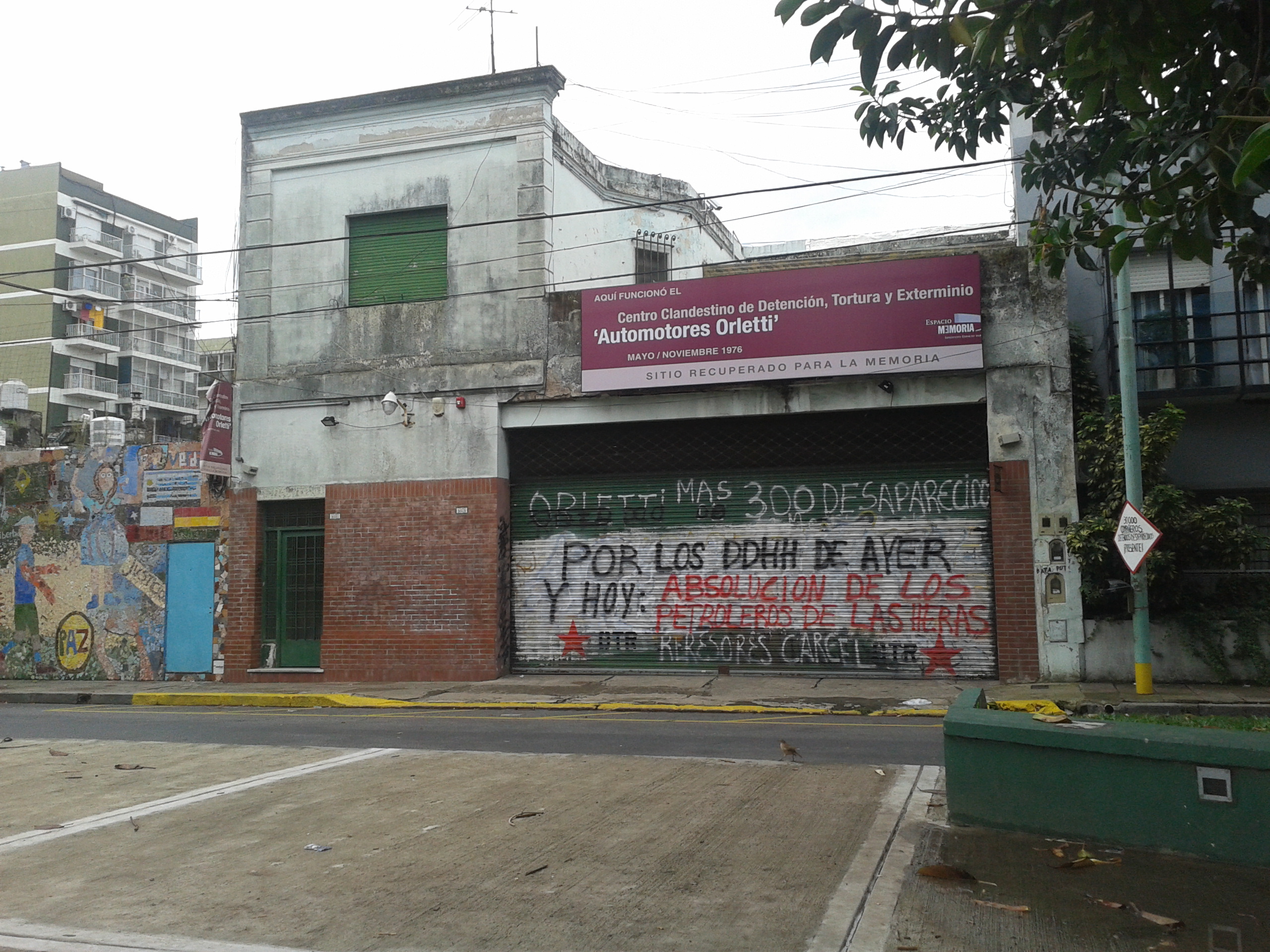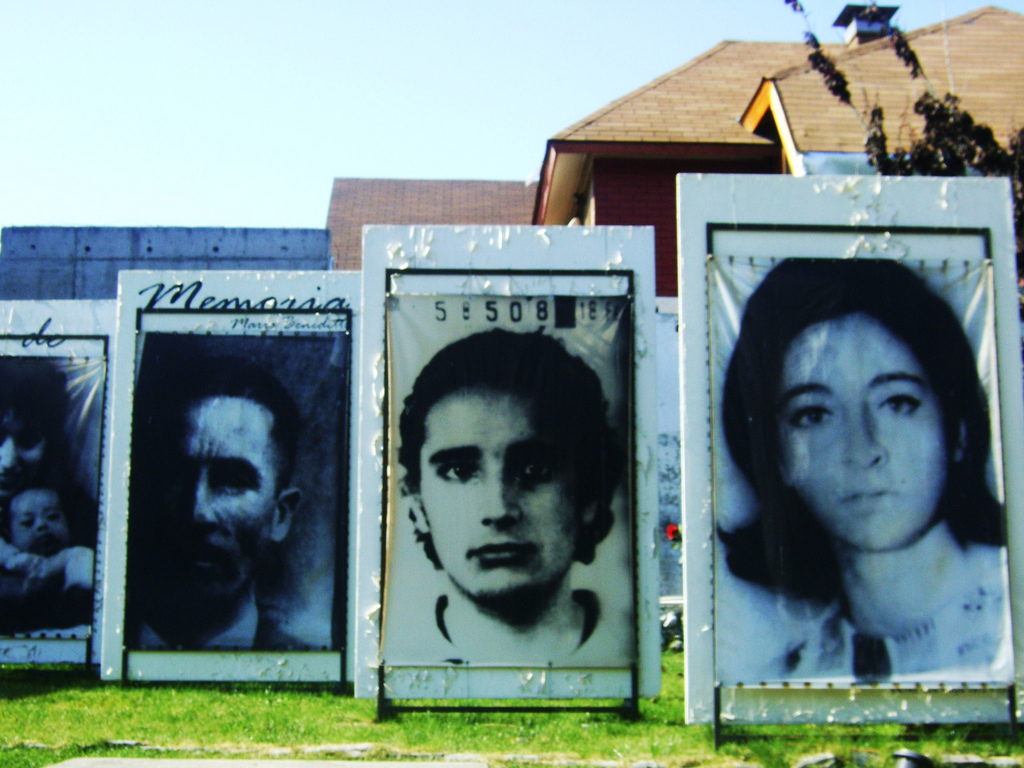|
María Emilia Islas
María Emilia Islas Gatti (18 April 1953 – disappeared 27 September 1976) was a Uruguayan political activist and anarchist, who disappeared in Buenos Aires in 1976. Biography She was born on 18 April 1953, at the Harvard Clinical Sanatorium in Montevideo. The only daughter of María Ester Gatti and Ramón Islas, María Emilia was named for her grandmother. She lived her first years in the Cordon neighbourhood. In 1965, María Emilia entered the Zorillia de San Martin high school where she became engaged in politics and political organizing. In 1970 she became more involved and joined the Federación Anarquista Uruguaya (FAU), the Oriental Revolutionary Popular Organization 33 (OPR 33); Asociación de Estudiantes de Magisterio en la Resistencia Obrero Estudiantil (ROE) and finally in Argentina, with the Party for Victory of the People (PVP). On 28 November 1973, she married Jorge Zaffaroni, also an activist. By 1974, the political situation in Uruguay became intolerable, ... [...More Info...] [...Related Items...] OR: [Wikipedia] [Google] [Baidu] |
Montevideo
Montevideo (, ; ) is the capital city, capital and List of cities in Uruguay, largest city of Uruguay. According to the 2023 census, the city proper has a population of 1,302,954 (about 37.2% of the country's total population) in an area of . Montevideo is situated on the southern coast of the country, on the northeastern bank of the Río de la Plata. A Portuguese garrison was established in the place where today is the city of Montevideo in November 1723. The Portuguese garrison was expelled in February 1724 by a Spanish soldier, Bruno Mauricio de Zabala, as a strategic move amidst the Spanish people, Spanish-Portuguese people, Portuguese dispute over the Río de la Plata Basin, platine region. There is no official document establishing the foundation of the city, but the "Diario" of Bruno Mauricio de Zabala officially mentions the date of 24 December 1726 as the foundation, corroborated by presential witnesses. The complete independence from Buenos Aires as a real city was not ... [...More Info...] [...Related Items...] OR: [Wikipedia] [Google] [Baidu] |
Uruguayan Anarchists
Uruguayans () are people identified with the country of Uruguay, through citizenship or descent. Uruguay is home to people of different ethnic origins. As a result, many Uruguayans do not equate their nationality with ethnicity, but with citizenship and their allegiance to Uruguay. Colloquially, primarily among other Spanish-speaking Latin American nations, Uruguayans are also referred to as "'' orientals s in Easterners'" (). Uruguay is, along with much of the Americas, a melting pot of different peoples, with the difference that it has traditionally maintained a model that promotes cultural assimilation, hence the different cultures have been absorbed by the mainstream. Uruguay has one of the most homogeneous populations in South America; the most common ethnic backgrounds by far being those from Spain, Italy, Germany and France i.e. Spanish Uruguayans, Italian Uruguayans, German Uruguayans, French Uruguayans and Polish Uruguayans. Immigration waves Most Uruguayans desce ... [...More Info...] [...Related Items...] OR: [Wikipedia] [Google] [Baidu] |
People From Montevideo
The term "the people" refers to the public or common mass of people of a polity. As such it is a concept of human rights law, international law as well as constitutional law, particularly used for claims of popular sovereignty. In contrast, a people is any plurality of persons considered as a whole. Used in politics and law, the term "a people" refers to the collective or community of an ethnic group or nation. Concepts Legal Chapter One, Article One of the Charter of the United Nations states that "peoples" have the right to self-determination. Though the mere status as peoples and the right to self-determination, as for example in the case of Indigenous peoples (''peoples'', as in all groups of indigenous people, not merely all indigenous persons as in ''indigenous people''), does not automatically provide for independent sovereignty and therefore secession. Indeed, judge Ivor Jennings identified the inherent problems in the right of "peoples" to self-determination, as i ... [...More Info...] [...Related Items...] OR: [Wikipedia] [Google] [Baidu] |
Missing Person Cases In Argentina
Missing or The Missing may refer to: Film *Missing (1918 film), ''Missing'' (1918 film), an American silent drama directed by James Young *Missing (1982 film), ''Missing'' (1982 film), an American historical drama directed by Costa-Gavras about the 1973 coup in Chile *, a Belgian film that was a List of 2007 box office number-one films in Belgium, 2007 box office number-one film in Belgium *''Missing'', a 2007 film featuring Nao Ōmori *Missing (2008 film), ''Missing'' (2008 film), a Hong Kong horror film directed by Tsui Hark *, a South Korean film directed by Kim Sung-hong *Missing (2009 short film), ''Missing'' (2009 short film), a film starring Susan Glover *Missing (2010 film), ''Missing'' (2010 film), a List of Jordanian films, Jordanian film directed by Tariq Rimawi *Missing (2016 film), ''Missing'' (2016 film), a South Korean film directed by Lee Eon-hee *Missing (2018 film), ''Missing'' (2018 film), an Indian film directed by Mukul Abhyankar *Missing (2019 film), ''Missing ... [...More Info...] [...Related Items...] OR: [Wikipedia] [Google] [Baidu] |
Missing People
Missing People (previously known as National Missing Persons Helpline) is a national organisation in the United Kingdom that offers assistance to people who run away and/or go missing and their families. It is a registered charity under English law. History Early years (1986–1989) Following the high-profile disappearance of estate agent, Suzy Lamplugh, from Fulham in July 1986, two sisters, Janet Newman and Mary Asprey, co-founded the National Missing Persons Helpline. The helpline was initially part of the Suzy Lamplugh Trust, but later they became separate organisations. Helpline (1990–1992) From a bedroom at the sisters' home in East Sheen, south west London, a start-up service was formed in early 1990. The service initially used the Freefone number 0500 700 700 (this number continued in operation until June 2017, when Ofcom closed down all remaining 0500 numbers; from 2009 onwards, the new 116000 number operated in parallel). Initially Mary and Janet and a smal ... [...More Info...] [...Related Items...] OR: [Wikipedia] [Google] [Baidu] |
Enforced Disappearances In Argentina
An enforced disappearance (or forced disappearance) is the secret abduction or imprisonment of a person with the support or acquiescence of a state followed by a refusal to acknowledge the person's fate or whereabouts with the intent of placing the victim outside the protection of the law. Often, forced disappearance implies murder whereby a victim is abducted, may be illegally detained, and is often tortured during interrogation, ultimately killed, and the body disposed of secretly. The party committing the murder has plausible deniability as there is no evidence of the victim's death. Enforced disappearance was first recognized as a human rights issue in the 1970s as a result of its use by military dictatorships in Latin America during the Dirty War. However, it has occurred all over the world. According to the Rome Statute of the International Criminal Court, which came into force on 1 July 2002, when committed as part of a widespread or systematic attack directed at any ... [...More Info...] [...Related Items...] OR: [Wikipedia] [Google] [Baidu] |
1970s Missing Person Cases
Year 197 ( CXCVII) was a common year starting on Saturday of the Julian calendar. At the time, it was known as the Year of the Consulship of Magius and Rufinus (or, less frequently, year 950 ''Ab urbe condita''). The denomination 197 for this year has been used since the early medieval period, when the Anno Domini calendar era became the prevalent method in Europe for naming years. Events By place Roman Empire * February 19 – Battle of Lugdunum: Emperor Septimius Severus defeats the self-proclaimed emperor Clodius Albinus at Lugdunum (modern Lyon). Albinus commits suicide; legionaries sack the town. * Septimius Severus returns to Rome and has about 30 of Albinus's supporters in the Senate executed. After his victory he declares himself the adopted son of the late Marcus Aurelius. * Septimius Severus forms new naval units, manning all the triremes in Italy with heavily armed troops for war in the East. His soldiers embark on an artificial canal between the Tigris a ... [...More Info...] [...Related Items...] OR: [Wikipedia] [Google] [Baidu] |
1953 Births
Events January * January 6 – The Asian Socialist Conference opens in Rangoon, Burma. * January 12 – Estonian émigrés found a government-in-exile in Oslo. * January 14 ** Marshal Josip Broz Tito is chosen President of Yugoslavia. ** The CIA-sponsored Robertson Panel first meets to discuss the UFO phenomenon. * January 15 ** Georg Dertinger, foreign minister of East Germany, is arrested for spying. ** British security forces in West Germany arrest 7 members of the Naumann Circle, a clandestine Neo-Nazi organization. * January 19 – 71.1% of all television sets in the United States are tuned into '' I Love Lucy'', to watch Lucy give birth to Little Ricky, which is more people than those who tune into Dwight Eisenhower's inauguration the next day. This record is never broken. * January 24 ** Mau Mau Uprising: Rebels in Kenya kill the Ruck family (father, mother, and six-year-old son). ** Leader of East Germany Walter Ulbricht announces that ... [...More Info...] [...Related Items...] OR: [Wikipedia] [Google] [Baidu] |


